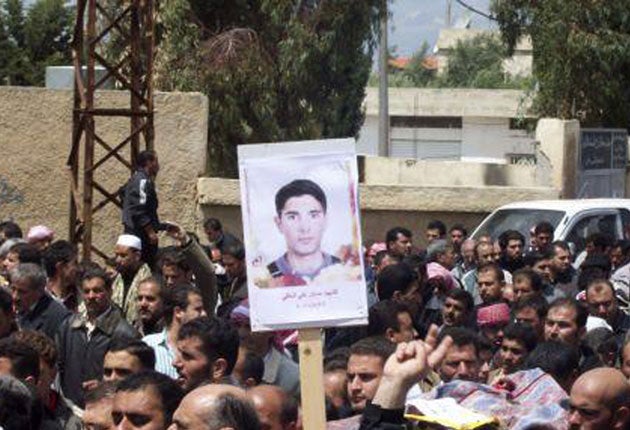At least 12 die as Syrian security forces open fire on mourners at funerals of protesters
After scores were killed on Friday, tens of thousands who turned out around the country yesterday faced a brutal response

Syrian security forces killed protesters on Friday – scores of them gunned down as they demanded changes from President Assad. Then, yesterday, the regime's goons went out and killed mourners at the funerals of those protesters. At least 12 died and dozens were wounded. Thus, once started, does the momentum of repression grow: first make some martyrs, then go out and make some more.
The official violence is, however, meeting a consistently determined response. Not only did large numbers chant and demonstrate on the streets yesterday, despite the ferocity of Friday's security force action, but two legislators resigned yesterday in protest at the killings. Khalil al-Rifai and Naser al-Hariri, both representatives of the troubled city of Deraa, announced on al-Jazeera they were quitting. "Security solutions do not work," Mr Rifai said.
There was always going to be severe tension on the streets yesterday after Friday's killing of scores of demonstrators, and Saturday's mourning swiftly became another trial of strength and nerve between the regime and its opponents. Tens of thousands turned out at various locations to bury Friday's dead, and their gatherings soon became highly charged events with people shouting anti-regime slogans as they carried coffins through the streets.
Witnesses said security forces killed four people in Douma, a suburb of the capital, and five in the southern village of Izraa. Witnesses said hundreds of mourners, dispersed by live ammunition outside Izraa, were shot at when they approached a checkpoint at the Sheikh Maskeen road junction as they headed back to the southern border city of Deraa. A Deraa resident told Reuters: "I saw three bodies carried by relatives and people shouting 'Allahu Akbar [God is greatest], they are martyrs'." Another witness who transported six wounded people in a minibus to Deraa hospital for treatment said he saw at least another eight wounded being carried by volunteers.
The witness account could not be independently confirmed because Syria has expelled foreign journalists and restricted access to trouble spots. They spoke on condition of anonymity for fear of reprisals. "They prevented us from continuing on our way to the cemetery," said the witness in Douma, who said he was among at least 50,000 people taking part in the funerals.
Mourners in Harasta, a town near Damascus, also came under fire from security forces, before staging a sit-in to demand the release of detainees arrested in the past few weeks. Protesters staged another sit-in after a funeral for four people from Irbeen, near Damascus. "We are not leaving until the political prisoners are released," one said. Damascus remained tense yesterday and many people stayed indoors, one activist told Reuters from the capital. "This is becoming like a snowball and getting bigger and bigger every week. Anger is rising. The street is boiling," he said.
The day before, Syrian security forces fired bullets and tear gas at tens of thousands of protesters across the country, in a clear sign that the regime was prepared to escalate its already bloody response. Friday's death toll was widely reported as 76, but some groups said more than 120 had been killed in the last two days. Some 300 people have died since the uprising began in mid-March.
Among those killed on Friday were a 70-year-old man and two boys aged seven and 10, according to Amnesty International. The scenes of carnage were posted on the protest movement's main Facebook page. In Izraa, a man ran through the streets carrying the body of a young boy, whose hair was matted with blood from a gaping head wound, as another child wept and shouted, "My brother!".
Six Syrian human rights groups called on the government to set up a judicial investigation committee to try those who shot at protesters and to release all political detainees.
The bloodshed so far has served only to invigorate protesters whose demands have grown from modest reforms to the downfall of the 40-year Assad dynasty. Each Friday, growing numbers of people around the country have taken to the streets.
President Assad has been trying to defuse the protests by offering concessions, granting citizenship to Syria's ostracised Kurdish minority, firing local officials, releasing detainees and forming a new government. The recent lifting of emergency laws – which allowed almost boundless powers of arrest – had been a top demand. But many said the concessions have come too late – and that Mr Assad does not even deserve the credit, because the protest movement has forced his hand.
Join our commenting forum
Join thought-provoking conversations, follow other Independent readers and see their replies
Comments
Bookmark popover
Removed from bookmarks